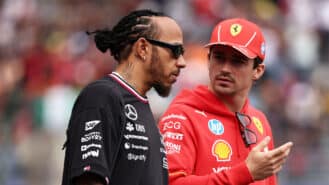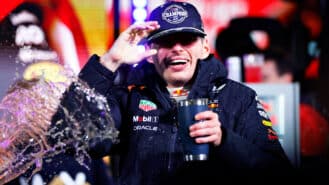
Verstappen proves Russell right: Abu Dhabi GP 2024 – Up/Down
Verstappen's prang at the first corner of the F1 finale in Abu Dhabi vindicated George Russell's recent rant
One day soon when cars have learned how to drive themselves – and it’s not even decades let alone centuries away – someone will sit down to write a history of the car as we know it today and realise that this was the era in which not only did we sacrifice all those things that made sporting cars great, we did so either willingly or, worse, without even realising.
I often think about those elements that would be non-negotiable components of my ideal driving machine and not once have I ever felt the need to include electric power steering, a paddle-shift transmission or a turbocharged engine.
And yet increasingly manufacturers who’d have once have had nothing to do with such trickery are embracing these technologies wholesale. There are, of course, reasons for this – indeed the same reason in all three cases: compared to traditional alternatives, each helps the manufacturer to improve theoretical fuel consumption and therefore lower CO2 emissions, meaning you have a lower tax bill and are therefore more likely to buy the car.
I understand that, even if these theoretical claims bear little or no relation to what actually happens in the real world. Where I baulk a bit is when manufacturers take these measures and then try to convince you they somehow make cars better to drive.
They don’t. I have never driven a car with electric steering that was as pleasant to guide through a corner as the car with hydraulic steering it replaced, not even in the new Porsche 911 GT3 I’ll be reviewing in the January issue of the magazine. I’ve never driven a car with paddles I’ve preferred to the manual transmission in its predecessor. And while I think the twin-turbo 5.5-litre V8 used by Mercedes to replace its normally aspirated 6.2-litre V8 in its AMG models is actually the superior engine, it exists only to provide the exception that proves the rule. I could go on: I’ve never driven a car with carbon ceramic brakes with a pedal that felt as good as an otherwise identical car with iron rotors. And I’ve never enjoyed a fast getaway using launch control as much as juggling all the factors necessary for success myself. But now every ‘M’ BMW is turbocharged, every AMG Mercedes has paddles and every Porsche sports car has electric steering. Even Ferrari will no longer sell you a car with manually operated gears.
It seems to me that enormous compromises are being made to simple driving pleasure and for what? Replacing the hydraulic steering of old 997 generation Porsche 911 with the new electric system of the 991 saves so little fuel that it equates to a free tank once every 40,000 miles, or once every three to four years if you use it regularly.
There are other examples: would you prefer to look at analogue dials or liquid crystal displays? Has you life been in any way enhanced by the appearance of the electric handbrake? What purpose does a starter button serve other than to increase tenfold the chance of you handing the car over to someone and walking off with the key in your pocket? And, as a grown adult, do you really need a car to shout at you until you put your seat-belt on?
What is extraordinary, then, is that cars continue to be fun to drive even though it is clearly despite rather than because of the technology with which they have been saddled.
A few days ago, just before I drove the new 991 GT3, I went for a decent blast on good roads in a three year old 997 GT3, complete with hydraulic steering and manual gears and fell in love with it all over again. It is a car with a magnetic personality that grabs your hand, drags you outside and forces you to play. But then I drove the new car and at once its predecessor felt slow and old because, by comparison, that is precisely what it is.
And it made me wonder how much better even than it is a car might be if designed with full use of modern techniques but applied to the traditional equipment I miss so much: a car with manual gears, a normally aspirated motor, hydraulically assisted steering (or ideally no assistance at all) and iron brakes. And while millions that fit this bill precisely are built every year and sold as shopping cars, among those specifically built to provide pure driving pleasure, it is only esoteric specialists like Caterham that can now satisfy these criteria.
Sadly I think their days are gone, certainly among more mainstream manufacturers of overtly sporting cars. Say what you like about flappy paddles, electric steering and turbocharged engines, they either make cars easier to drive, cheaper to run or their owners feel more like racing drivers. Even if I could persuade someone to make the car of my dreams, the hard truth is hardly anyone would want to buy it. And such considerations count for far more than simple driving pleasure.
Click here for more on road cars

Verstappen's prang at the first corner of the F1 finale in Abu Dhabi vindicated George Russell's recent rant

FIA president Mohammed Ben Sulayem seemed intent on making F1 a united front by the end of the 2024 Qatar GP – against him

Leclerc erupted after feeling wronged one time too many by Sainz in Vegas – but the challenge posed by his team-mate next year, Lewis Hamilton, will be much greater writes James Elson

2024 has been Max Verstappen's masterclass – it should go down in history as one of F1's greatest titles